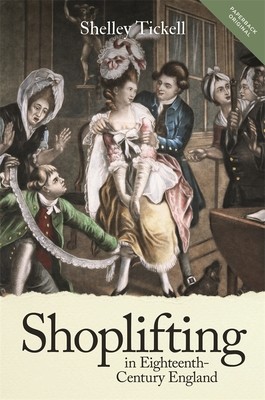
- We will send in 10–14 business days.
- Author: Shelley Tickell
- Publisher: Boydell Press
- ISBN-10: 1783273283
- ISBN-13: 9781783273287
- Format: 15.6 x 23.4 x 1.3 cm, softcover
- Language: English
- SAVE -10% with code: EXTRA
Reviews
Description
As a new consumer culture took root in eighteenth-century England and shops proliferated, the crime of shoplifting leaped to public prominence.
Shoplifting in Eighteenth-Century England examines the nature and impact on society of this commercial crime at a time of rapid retail expansion during the long eighteenth century. As a new consumer culture took root in England and shops proliferated, the crime of shoplifting leaped to public prominence. In 1699 shoplifting became a hanging offence. Yet whether compelled by need or greed, shoplifters continued to operate in substantial numbers on the shopping streets of London and provincial towns. Regarded initially as exclusively a crime of the poor, the eighteenth century witnessed a transformation in the public perception and understanding of such customer theft, signalled by the shocking arrest of Jane Austen's wealthy aunt for shoplifting in 1799.This book shows, through systematic profiling of those who committed this crime, that shoplifting was primarily a crime of the poor and predominantly an opportunist one. Providing both quantitative analysis and engaging insights into real-life stories, the book describes the variable strategies adopted by shoplifters to raid elite and poorer stores, the practical responses of shopkeepers to this predation and the financial impact on their businesses. It investigates the trade lobbying that led to the passing of the Shoplifting Act, the degree to which retailers co-operated with the judiciary and their engagement with the capital law reform movement of the later eighteenth century. Examining the range of goods stolen, the book also addresses questions of whether or not this form of theft was driven by consumer desire andsuggests that more subtle social and economic motives were at work. SHELLEY TICKELL is a Visiting Research Fellow at the University of Hertfordshire
EXTRA 10 % discount with code: EXTRA
The promotion ends in 19d.22:33:26
The discount code is valid when purchasing from 10 €. Discounts do not stack.
- Author: Shelley Tickell
- Publisher: Boydell Press
- ISBN-10: 1783273283
- ISBN-13: 9781783273287
- Format: 15.6 x 23.4 x 1.3 cm, softcover
- Language: English English
As a new consumer culture took root in eighteenth-century England and shops proliferated, the crime of shoplifting leaped to public prominence.
Shoplifting in Eighteenth-Century England examines the nature and impact on society of this commercial crime at a time of rapid retail expansion during the long eighteenth century. As a new consumer culture took root in England and shops proliferated, the crime of shoplifting leaped to public prominence. In 1699 shoplifting became a hanging offence. Yet whether compelled by need or greed, shoplifters continued to operate in substantial numbers on the shopping streets of London and provincial towns. Regarded initially as exclusively a crime of the poor, the eighteenth century witnessed a transformation in the public perception and understanding of such customer theft, signalled by the shocking arrest of Jane Austen's wealthy aunt for shoplifting in 1799.This book shows, through systematic profiling of those who committed this crime, that shoplifting was primarily a crime of the poor and predominantly an opportunist one. Providing both quantitative analysis and engaging insights into real-life stories, the book describes the variable strategies adopted by shoplifters to raid elite and poorer stores, the practical responses of shopkeepers to this predation and the financial impact on their businesses. It investigates the trade lobbying that led to the passing of the Shoplifting Act, the degree to which retailers co-operated with the judiciary and their engagement with the capital law reform movement of the later eighteenth century. Examining the range of goods stolen, the book also addresses questions of whether or not this form of theft was driven by consumer desire andsuggests that more subtle social and economic motives were at work. SHELLEY TICKELL is a Visiting Research Fellow at the University of Hertfordshire


Reviews